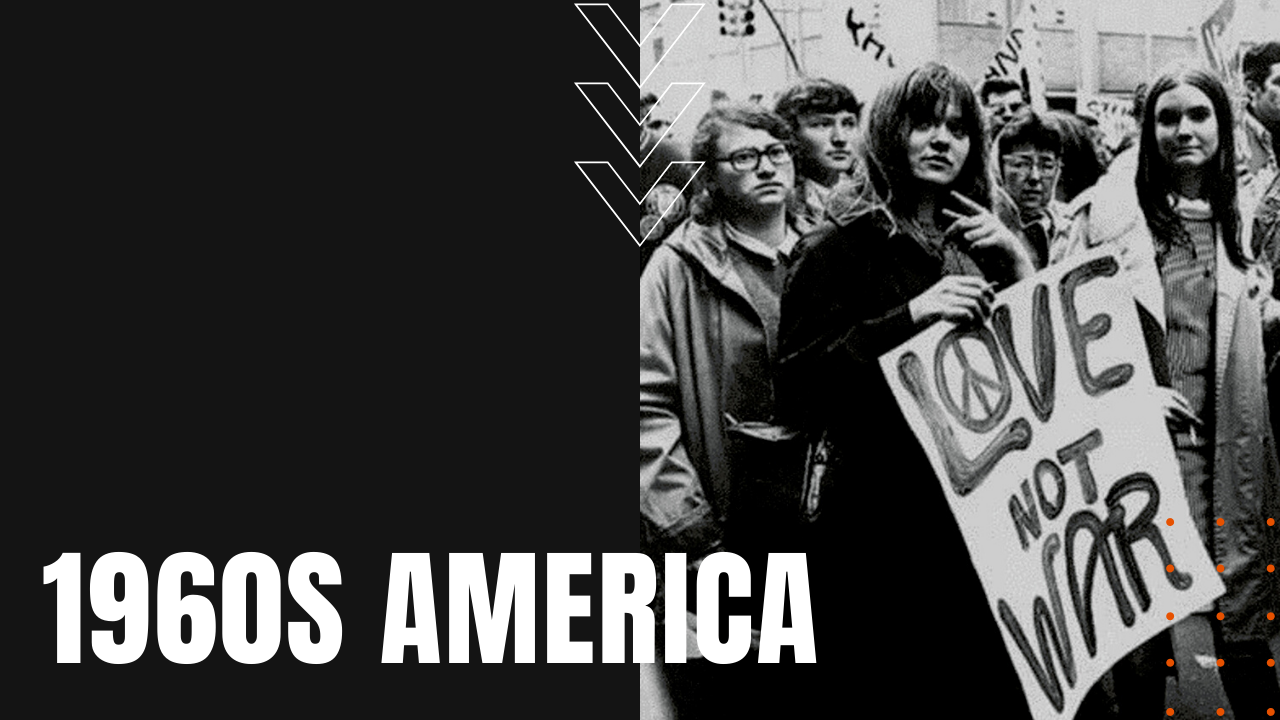1960s America

After President John F. Kennedy encouraged a nation to put men on the moon before the end of the decade, the American Sixties was officially set in motion two years later, upon JFK’s assassination on November 22nd, 1963.
Cold War, Vietnam War, and Fights Back Home
Already made anxious by Cold War fears of mutually-assured nuclear destruction with the Soviet Union, Americans would spend the 1960s deeply divided over the Cold War-inspired Vietnam War, which saw 58,220 Americans killed in action, with another 304,000 returning home wounded to an anti-Vietnam War protest movement that labeled returning vets as baby killers.
Back on the home front, on May 22nd, 1964, President Lyndon Baines Johnson delivered his “Great Society” speech at the University of Michigan, where he encouraged Americans to aspire not only toward a rich and powerful society, but upward toward a Great Society, rallying the masses behind his primary objective of eliminating poverty and racial injustice.
Civil Rights Movement of the 1960s
His Great Society platform would lead to the Civil Rights Act of 1964, the Voting Rights Act of 1965, and the creation of Medicare and Medicaid on August 30th of that same year, and while men like Martin Luther King, Jr. would lead the Civil Rights Movement of the 1960s, the nation would devolve into more than 750 race riots from 1964 to 1971, taking the lives of 228 people while injuring 12,741 more.
1960s Music and Culture
By the start of the British Rock Invasion in 1964, at the same time, American youth embraced the hippy, free love counter-culture movement, which clashed head on with the mores of their war generation parents. Like-minded American youth flocked to San Francisco for the Human Be-in of 1966, where acid guru Timothy Leary encouraged the gathering of 30,000 hippies to:
“Turn on, tune in and drop out.”
Timothy Leary
The Summer of Love was to follow in 1967, but by 1868, the American political landscape had once again turned violent in ways that shook Americans to their core.
Tragic Assassinations
On April 4th, 1968, while leaving the Lorraine Hotel in Memphis Tennessee, Martin Luther King, Jr. was unjustly taken by assassin James Earl Ray, while on June the 6th of that same year, after a speech in front of supporters during his presidential campaign, Robert Kennedy was assassinated by pro-Palestinian sympathizer Sirhan Sirhan, who claimed to have murdered Kennedy for his political support of Israel.
Later that same year, Richard Nixon won the White House, while on July 20th, 1969, Neal Armstrong became the first man to walk on the moon. Insert sound bite, “one small step.” Considered the spiritual end of the American 1960s, at least 400,000 American youth packed onto Max Yasgur’s dairy farm for the three-day Woodstock Music & Art Fair, bringing to a close one of the most tumultuous decades in American history.
